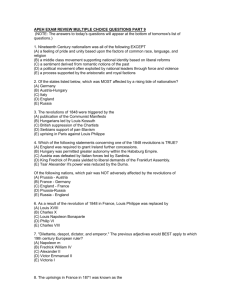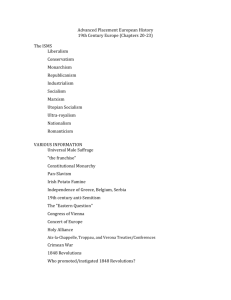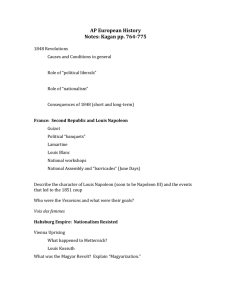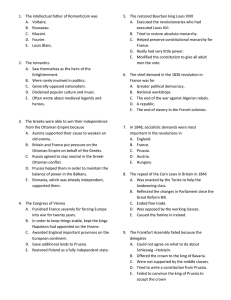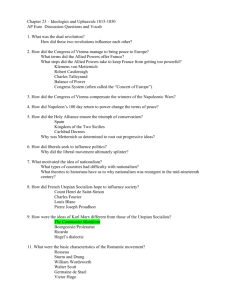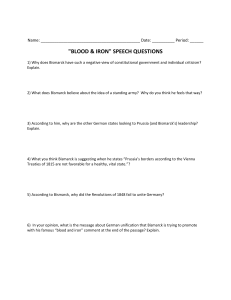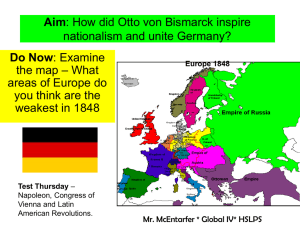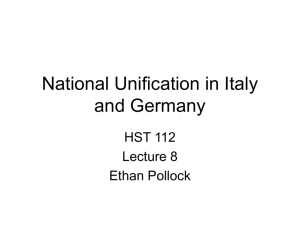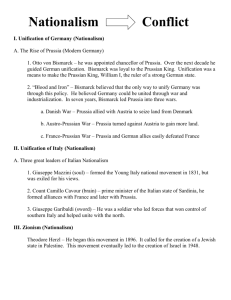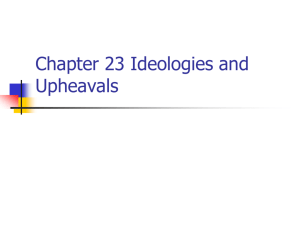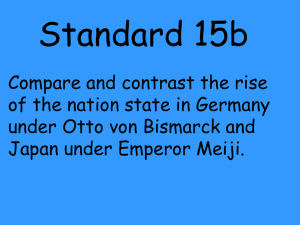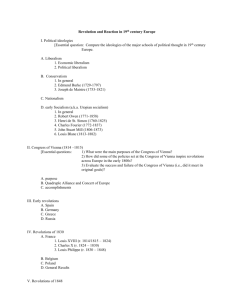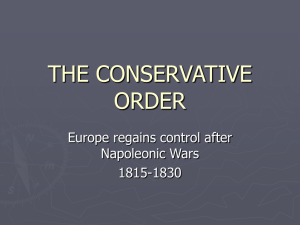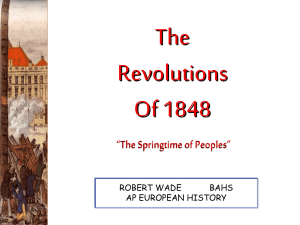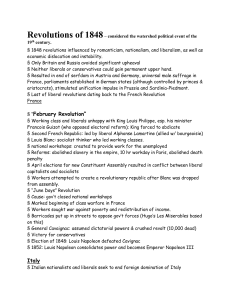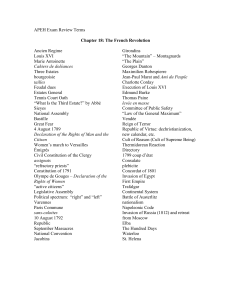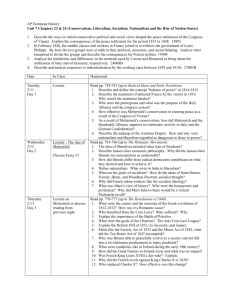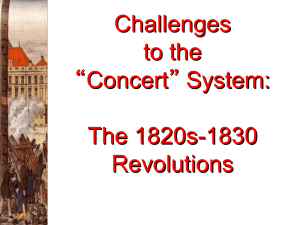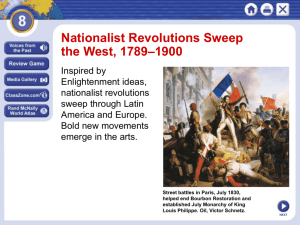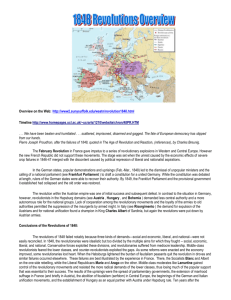apeh exam review
advertisement
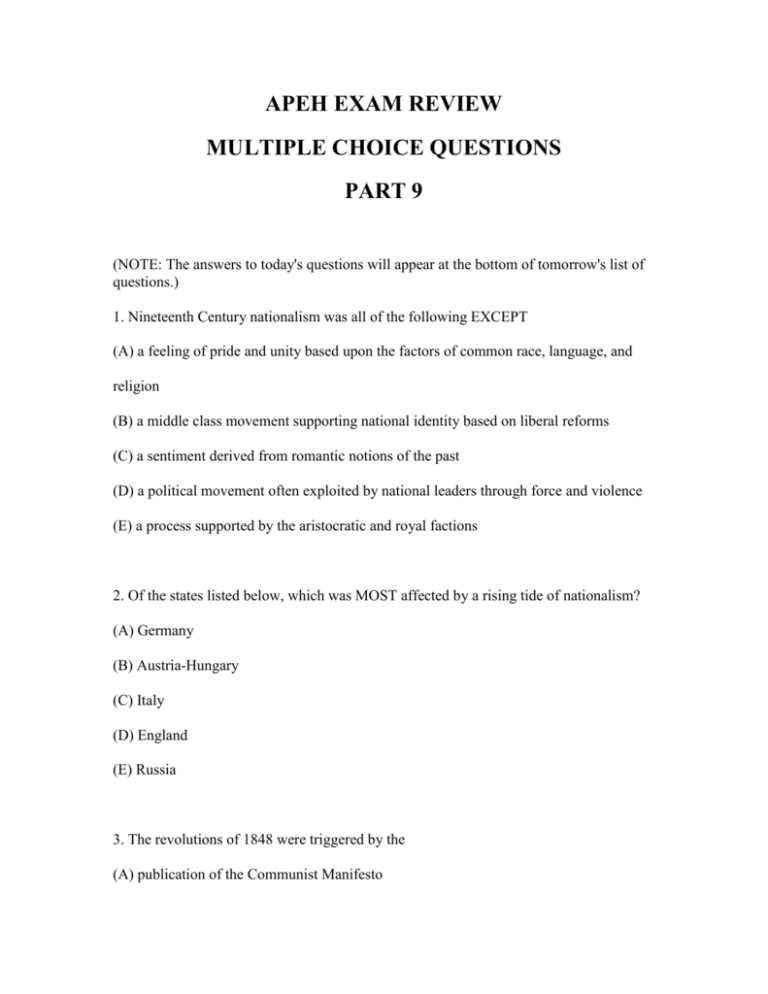
APEH EXAM REVIEW MULTIPLE CHOICE QUESTIONS PART 9 (NOTE: The answers to today's questions will appear at the bottom of tomorrow's list of questions.) 1. Nineteenth Century nationalism was all of the following EXCEPT (A) a feeling of pride and unity based upon the factors of common race, language, and religion (B) a middle class movement supporting national identity based on liberal reforms (C) a sentiment derived from romantic notions of the past (D) a political movement often exploited by national leaders through force and violence (E) a process supported by the aristocratic and royal factions 2. Of the states listed below, which was MOST affected by a rising tide of nationalism? (A) Germany (B) Austria-Hungary (C) Italy (D) England (E) Russia 3. The revolutions of 1848 were triggered by the (A) publication of the Communist Manifesto (B) Hungarians led by Louis Kossuth (C) British suppression of the Chartists (D) Serbians support of pan-Slavism (E) uprising in Paris against Louis Phillipe 4. Which of the following statements concerning one of the 1848 revolutions is TRUE? (A) England was required to grant Ireland further concessions. (B) Hungary was permitted greater autonomy within the Habsburg Empire. (C) Austria was defeated by Italian forces led by Sardinia. (D) King Fredrick of Prussia yielded to liberal demands of the Frankfurt Assembly. (E) Tsar Alexander II's power was reduced by the Duma. 5. Of the following nations, which pair was NOT adversely affected by the revolutions of 1848 (A) Prussia - Austria (B) France - Germany (C) England - France (D) Prussia-Russia (E) Russia - England 6. As a result of the revolution of 1848 in France, Louis Phillipe was replaced by (A) Louis xvm (B) Charles X (C) Louis Napoleon Bonaparte (D) Philip VI (E) Charles VIII 7. "Dilettante, despot, dictator, and emperor." The previous adjectives would BEST apply to which 19th century European ruler? (A) Napoleon III (B) Fredrick William IV (C) Alexander II (D) Victor Emmanuel II (E) Victoria I 8. The uprisings in France in 1871 was known as the (A) Second Revolution (B) Third Republic (C) Paris Commune (D) Massacre of Chios (E) The Affair of the Barricades 9. The Dreyfus Affair of 1894 provided a controversial instance of (A) monarchism (B) infidelity (C) militarism (D) anti-semitism (E) corruption 10. Bismarck was able to become chancellor of Prussia as a result of (A) a coup d'etat (B) popular election (C) revolution in 1848 (D) popular demand (E) appointment by the king 11. Bismarck's success in diplomacy was based upon his policies of (A) liberalism and pacifism (B) nationalism and militarism (C) socialism and communism (D) democracy and constitutionalism (E) absolutism 12. Bismarck's overall Realpolitik is best exemplified by his (A) combining liberal and progressive Prussian concepts (B) clever manipulation of the German masses (C) policies based upon pragmatic understanding of international affairs (D) disregard of religious divisions (E) autocratic leadership 13. As Prussian chancellor, Bismarck's major objective was to (A) strengthen the economy (B) enhance democracy (C) unite Germany (D) support the monarchy (E) consolidate the economy 14. Which term signifies a united German culture? (A) Volksgeist (B) Blut und Eisen (C) Realpolitik (D) Landtag (E) Drang nach Osten 15. The Danish War of 1864 was instigated over the question of (A) reparations (B) Schleswig-Holstein (C) the Zollverein (D) the Sudetenland (E) access to the North Sea Part 8 1-D, 2-B, 3-C, 4-B, 5-D, 6-C, 7-B, 8-A, 9-A, 10-D, 11-A, 12-C, 13-C, 14-A, 15-B, 16-C, 17-B, 18-C
